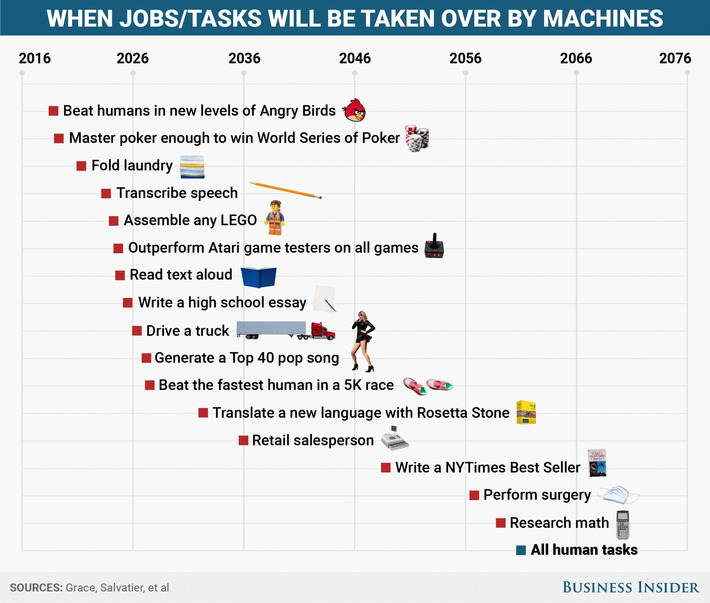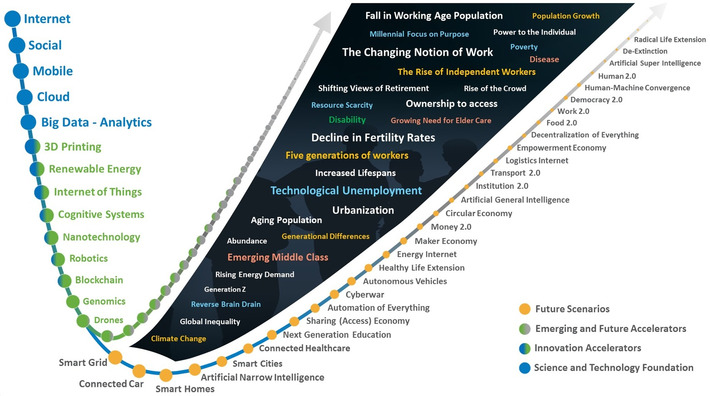The robots are indeed already here. I work at a university where my job is teaching students and doing research and robotics and so I really what I want to convey to you today is the trends that I see robotics research going that will ultimately turn into actual products and directions that you might be able to take advantage of in the future.
Get Started for FREE
Sign up with Facebook Sign up with X
I don't have a Facebook or a X account
 Your new post is loading... Your new post is loading...

Farid Mheir's curator insight,
January 16, 2017 9:18 AM
Perfect Sunday morning reading which is guaranteed to make you reflect and ponder for the next weeks. The article is a typical New Yorker one, very well researched and written. So captivating that it got me to start reading the book which appears to be as captivating and surprisingly easy to read and understand. I love those finds and have the feeling this book will be the best complement to "Singularity is Near" and "On Intelligence" that I wrote about in the past.
- book "singularity is near": http://fmcs.digital/blog/singularity-is-near-an-essential-read-to-understand-why-technology-evolves-so-fast/ - book "on intelligence": http://fmcs.digital/blog/on-intelligence-mustread-to-understand-frontal-cortex-architecture-what-makes-us-intelligent/ - article "Why the future does not need us": http://fmcs.digital/blog/why-the-future-doesnt-need-us-a-reminder-that-ai-may-have-a-bad-side-via-wired/ - related posts: http://www.scoop.it/t/digital-transformation-of-businesses/?tag=Singularity+is+Near

Farid Mheir's curator insight,
January 14, 2017 2:17 PM
Perfect Sunday morning reading which is guaranteed to make you reflect and ponder for the next weeks. The article is a typical New Yorker one, very well researched and written. So captivating that it got me to start reading the book which appears to be as captivating and surprisingly easy to read and understand. I love those finds and have the feeling this book will be the best complement to "Singularity is Near" and "On Intelligence" that I wrote about in the past.
- book "singularity is near": http://fmcs.digital/blog/singularity-is-near-an-essential-read-to-understand-why-technology-evolves-so-fast/ - book "on intelligence": http://fmcs.digital/blog/on-intelligence-mustread-to-understand-frontal-cortex-architecture-what-makes-us-intelligent/ - article "Why the future does not need us": http://fmcs.digital/blog/why-the-future-doesnt-need-us-a-reminder-that-ai-may-have-a-bad-side-via-wired/ - related posts: http://www.scoop.it/t/digital-transformation-of-businesses/?tag=Singularity+is+Near |

Curated by Farid Mheir
Get every post weekly in your inbox by registering here: http://fmcs.digital/newsletter-signup/
|

















WHY IT MATTERS : the video provides a great review of the state of technology when it comes to robots and robotics today from one of the leading researcher in the field. The talk is peppered with short videos of actual robots so you get a good sense of what's possible today. But remember that we live in an exponential growth era, so things improve very fast.